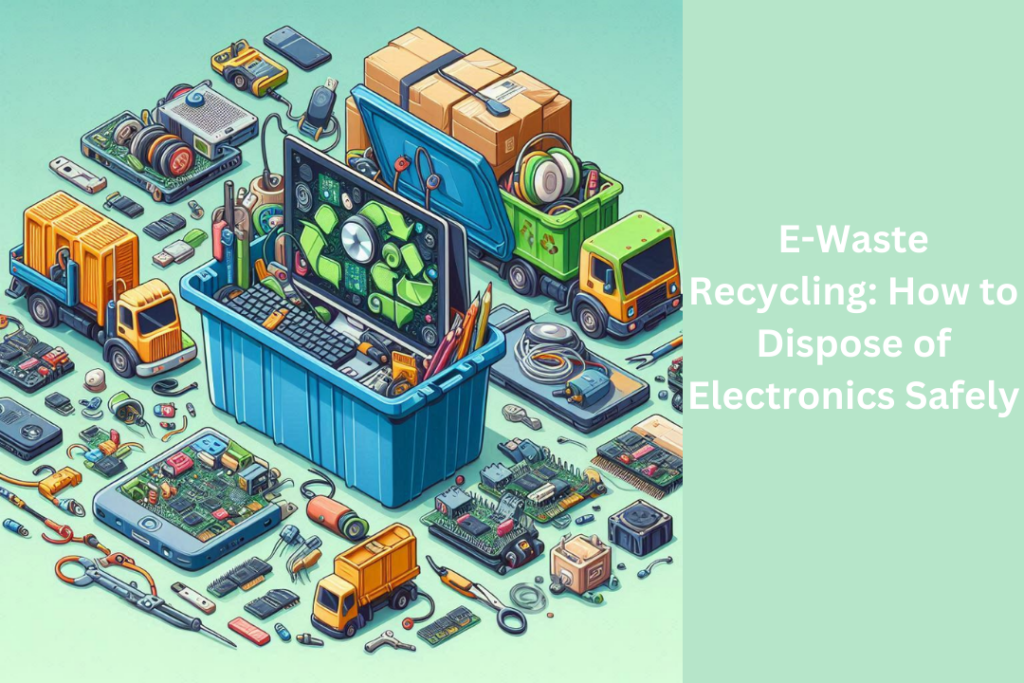
Introduction
In our tech-driven world, gadgets and gizmos are a staple in our daily lives. But what happens when they outlive their usefulness? This is where E-waste recycling comes into play. Disposing of electronics safely is crucial for the environment. It is also crucial for our health. Let’s dive into e-waste recycling. We’ll find out how we can all help make the planet cleaner.
What is E-Waste?
E-waste, or electronic waste, refers to discarded electronic devices. This can include anything from old smartphones and laptops to refrigerators and televisions. Technology advances. This shortens the lifespan of these devices, leading to lots of e-waste.
Why is E-Waste Recycling Important?
E-waste contains harmful materials like lead, mercury, and cadmium. They can harm the environment and human health if not thrown away properly. Recycling e-waste helps to:
- Reduce pollution by preventing toxic substances from leaching into the soil and water.
- Conserve natural resources by reclaiming valuable materials like gold, silver, and copper.
- Save energy compared to producing new materials from scratch.
- Support local communities by creating jobs in the recycling industry.
How to Recycle E-Waste
Step-by-Step Guide
- Gather Your E-Waste: Collect all the electronic devices you no longer use or need.
- Check for Recyclability: Some items can be recycled. Others might need special disposal.
- Delete Personal Data: Make sure all personal info is wiped from your devices. This will protect your privacy.
- Find a Recycling Program: Look for local e-waste recycling programs or drop-off points.
- Drop Off Your E-Waste: Take your e-waste to the designated recycling center.
Where to Recycle E-Waste
- Retail Stores: Many electronics retailers offer e-waste recycling programs.
- Municipal Programs: Check if your local government provides e-waste collection services.
- Specialized Recycling Centers focus on e-waste: They can handle various electronics.
- Some manufacturers have programs to take back their products for recycling.
Benefits of E-Waste Recycling
Recycling e-waste offers numerous benefits, including:
- Environmental Protection: Prevents harmful chemicals from contaminating the environment.
- Resource Conservation: Recovers precious metals and other materials for reuse.
- Energy Savings: Reduces the energy required to produce new products.
- Economic Growth: Creates jobs and supports the recycling industry.
Common Misconceptions About E-Waste Recycling
- It’s Too Complicated: Many believe that recycling e-waste is a complex process. However, numerous resources and programs make it straightforward and accessible.
- All E-Waste is Recyclable: Not all electronic devices can be recycled. It’s essential to check what items your local recycling center accepts.
- Recycling centers are hard to find: More are available with increasing awareness. They make it easier to dispose of e-waste safely.
Conclusion
E-waste recycling is essential for maintaining a healthy environment and conserving valuable resources. Follow the steps above. Use recycling programs. Then, you can ensure that your old electronics are disposed of safely.
FAQs
Q1: What is e-waste?
E-waste refers to discarded electronic devices. These include computers, TVs, and mobile phones that are no longer in use.
Q2: Why is e-waste recycling important?
Recycling e-waste prevents harmful materials from harming the environment and people. It also recovers valuable resources.
Q3: How can I recycle my old electronics?
You can recycle your old electronics by gathering them. Then, wipe their personal data. Take them to local recycling centers, retail stores, or manufacturer take-back programs.
Q4: What should I do before recycling my electronic devices?
Before recycling, make sure you delete all personal data from your devices. This protects your privacy.
Q5: Are all electronic devices recyclable?
Not all electronic devices are recyclable. Check with your local recycling center to see what items they accept.
Q6: Where can I find e-waste recycling centers?
You can find e-waste recycling centers through city programs. You can also find them at specialized recycling centers and retail stores.
Q7: What are the benefits of e-waste recycling?
Recycling e-waste protects the environment. It saves resources and energy. It also supports economic growth by creating jobs.
Q8: Can I throw e-waste in the regular trash?
No. E-waste should not go in the regular trash. It has hazardous materials that can harm the environment.


2 Comments
Comments are closed.